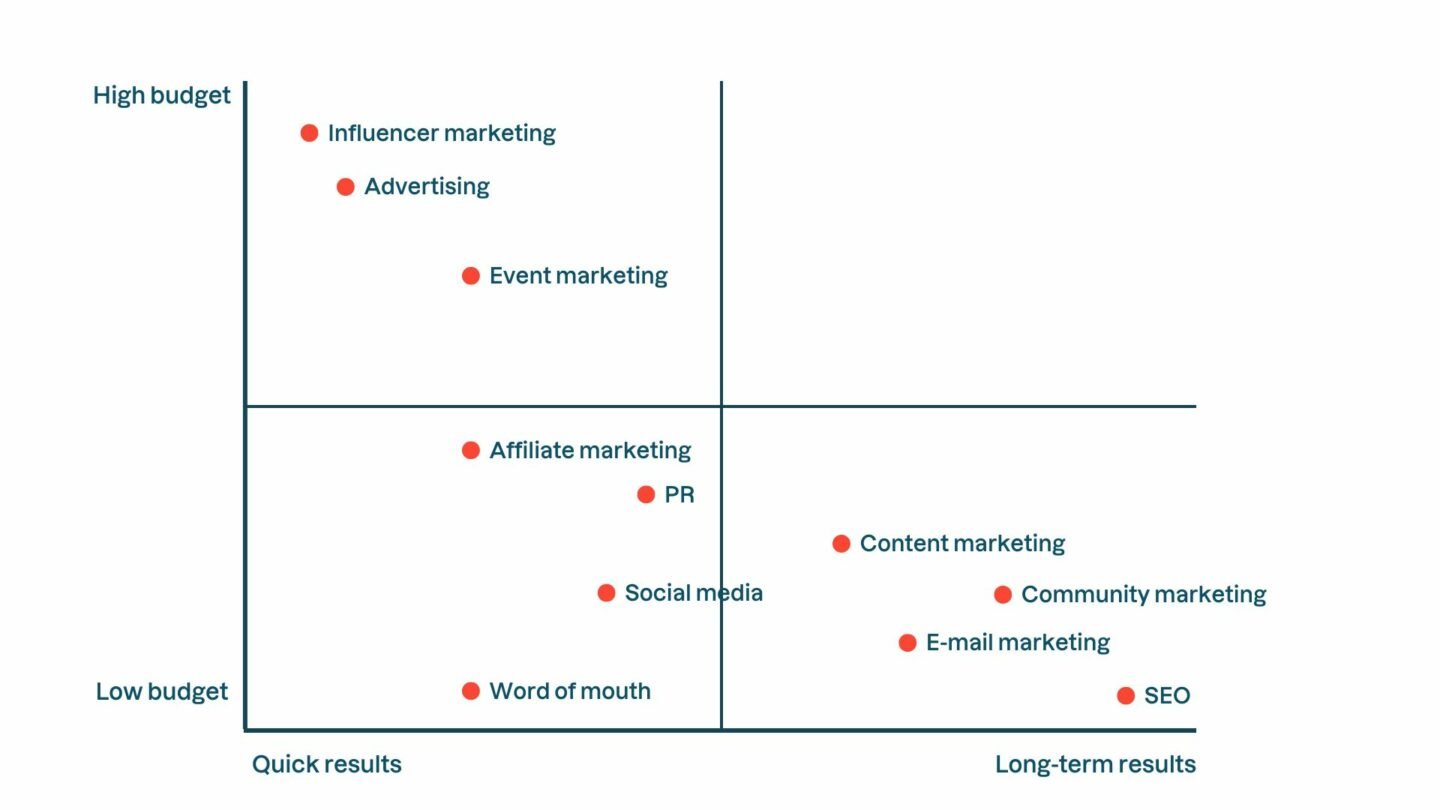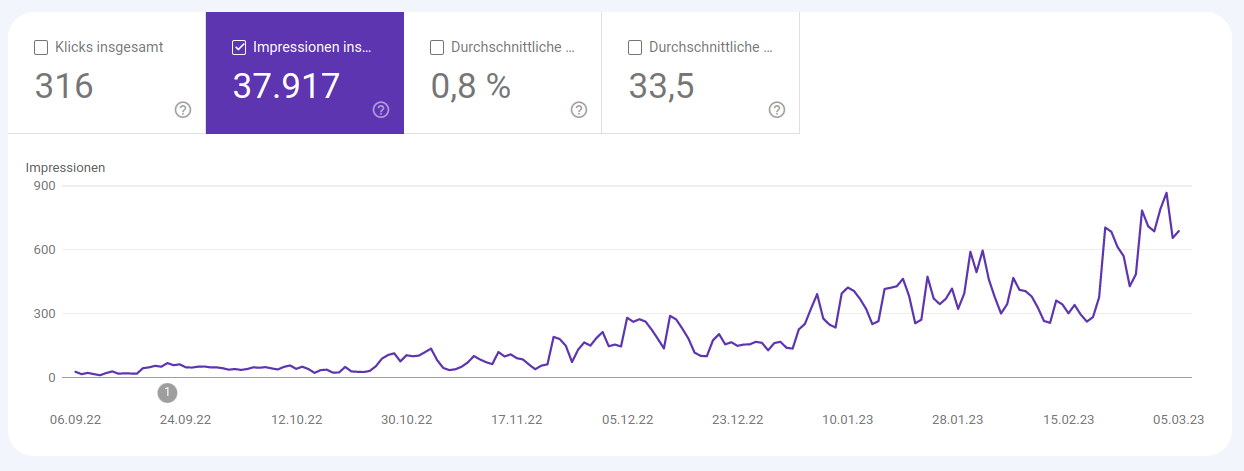Why an ESG Strategy is Essential for Startup Success
Why is an ESG Strategy Important for Startups?ESG (Environmental, Social, Governance) is not a...
By: Johannes Fiegenbaum on 4/30/24 11:48 AM

Growth marketing can provide start-ups with targeted support to help them grow quickly, sustainably and effectively. I will explain to you what growth marketing is and which measures you can use to achieve your company's goals. The exciting thing is that in growth marketing, all disciplines in marketing, and also in the company, are considered as a whole - not separated from each other in silos. This means that these marketing strategies can be immensely effective even without a large budget, expand the user base and promote company growth in the long term.
Referral marketing & online reviews
What is growth marketing actually? Growth marketing is a data-based strategy that uses various approaches to help a company grow quickly, achieve greater reach and thus generate more leads and active customers. The success of the individual measures is measured and evaluated using so-called KPIs (key performance indicators).
In this context, growth marketing is often associated with growth hacking. The difference: in growth hacking, the focus is on rapid growth with one measure on one channel in order to acquire new customers. There is no holistic approach and no long learning phase; instead, one attempt, or hack, follows the next in order to achieve the fastest possible growth.
The term "growth hacking" suggests shortcuts, tricks and super-small windows of opportunity. It suggests that you are on a kind of hunt for success. Jumping from "hack" to "hack" without ever committing to a sustainable growth process.
It leads laypeople to believe that there is a single tactic that can increase success 100-fold overnight and that it's your job as a marketer to find it.
That's a myth. And that's not how it works.
A more accurate term would be "growth iteration" or "growth optimization", but neither sounds as cool as "growth hacking".
Hacks and tricks aren't what turn good startup ideas into billion-dollar companies like Airbnb or Dropbox. Instead, these companies use a methodical process that is central to how their entire business works.
There's a good summary from Y Combinator:
One of the most common types of advice we give at Y Combinator is to do things that don't scale. A lot of would-be founders believe that startups either take off or don't. You build something, make it available, and if you've made a better mousetrap, people beat a path to your door as promised. Or they don't, in which case the market must not exist. Actually startups take off because the founders make them take off.
It's about consistency and perseverance. There are no shortcuts.
You can also read my articles on general startup marketing strategy and branding for startups.
In order to not only pump out ads in the short term, but also to achieve long-term success and increasing growth of your startup, the foundations for marketing measures should be in place:
This is how we try to prevent so-called random acts of marketing. Random acts of marketing are marketing practices that are not based on key figures and are not supported by strategies or insights. They are tactics that chase the quick euro. They are activities that are prioritized based on who has the loudest voice or the last word, or what's the latest trend, not what measurably gets results.
If you want all your marketing investments and tactics to work, they need to be efficient and backed by a good strategy. Marketing strategy is about where you play, what you sell and how you position the company and its offerings against the competition. It is not possible without consciously gained insights. A good strategy is based on a precise knowledge of your customers' problems and the problems you solve for them. Knowledge of your competitors and answers to the question of how you can position yourself against them, where your strengths lie and how you can use them to achieve your goals and win.
Below I share with you a list of approaches for a successful growth marketing strategy for your startup that can work as a starting point.

Growth marketing is not just about customer acquisition, but also about attracting and retaining active customers. Your own website with its functions and content is central to this. Does it get to the heart of your value proposition? Does it convey the right brand image? Does it support the deal? The aim is also to provide seamless support for the buyer persona throughout the sales process. It's all about the right content in the right place at the right time. With PDFs, webinars, product demos, comparisons, customer opinions - preferably without access restrictions - you position yourself as the solution to your target group's problems. This builds brand awareness and authority and attracts visitors to the website. With content marketing, you can answer the most frequently asked questions of your target group and thus offer valuable added value.
Necessary for successful content marketing: a uniform buyer persona across all disciplines in the company. This is the only way to focus on the customer's intention and optimize the customer journey towards their goal. On average, content marketing generates three times as many leads as outbound marketing and costs 62% less.
Content marketing is effective because it:
Newsletters are still one of the most effective tools in marketing, because email marketing is very well suited for customer care, but also for attracting new customers. With a personal newsletter on various offers, data can be collected in order to use the results to push a product launch, a sale or simply to share relevant information. However, it is important that the content is relevant and helpful.
To get email recipients in the first place, meta lead ads are worthwhile. I have written a comprehensive guide on this here.
Cold emails can also be used to a limited extent if you communicate very openly and conscientiously.
Important for newsletters: Know which target group is being addressed, whether B2C or B2B, as well as consistent branding to support the storytelling. There are now numerous marketing tools available for implementation, such as Active Campaign or Mailchimp. Find out more in my article on the best marketing tools for start-ups.
Email marketing is effective because newsletters:With public relations work, startups can effectively increase their brand awareness and improve their ranking in search engines. Potential customers come across credible sources when researching the company, which can have a positive influence on their decision. Important for PR work: success does not come overnight, the company's storytelling should be consistent and the goals should be set for the long term.
Choose the most interesting platforms or magazines that could report on your company. Then contact the editors if you have important company news to report or can provide proprietary insights and statistics or data for articles. If your name keeps coming up in connection with a particular topic, you'll build authority, become known as an expert and become more relevant for further media partnerships.
Press relations and PR are effective because they:There is no question that social media can now be a powerful tool for startups to reach their target audience, increase traffic and maintain relationships with customers. Social media channels are also often used by customers for customer service, to clarify common questions or to find out about a company's latest offers.
Here is a selection of tips for getting started successfully on social media:
Influencer marketing is one of the best ways to achieve additional growth, especially in B2C. It can be used for short-term, but also for long-term goals to increase visibility on social media channels, boost conversion rates and generate site visitors. In contrast to traditional advertising strategies, influencer marketing has a more authentic and emotional impact on the target group - even if many users understand that influencers are ultimately for sale. But product placement can also be found in every James Bond film. This is because potential customers are looking for security and believe they have found it when a well-known influencer or James Bond recommends or places something.
With the right influencers, start-ups can expand their target group and increase awareness. Do you need a large budget for influencer marketing? Yes and no. Influencer marketing can also be worthwhile with a small budget, for example by selecting suitable micro-influencers.
Questions for a successful influencer concept:
Influencer marketing is helpful because
Using a podcast as a channel is cost-effective, authentic and makes your company approachable. To increase your target group, you can appear as a guest on other podcasts and thus be perceived as an expert, share your content with a different target group and increase your visibility. Another bonus: The content of the podcast can subsequently be recycled on other platforms.
Postcasts are a good vehicle because
What good is high-quality content if nobody reads it? Right - not very much. But with search engine optimization, or SEO for short, you can place your content on the first page of search engines - free of charge. Optimize the texts on your homepage, set suitable keywords that your target group is searching for and create a regular long content format, such as a blog. The best thing about SEO? It works for you in the background and generates long-term reach and website traffic. A strong SEO strategy can be divided into three components: On-page, off-page and technical SEO.
Technical SEO, i.e. formatting, alt texts for images, time to first byte, internal links, etc., is often overestimated. Here you should be guided by Google's E-A-T concept. Thisis a concept defined by Google for the evaluation of websites in the Quality Rater Guidelines. E-A-T stands for Expertise, Authoritativeness and Trustworthiness. This applies both to thewebsite in general and to the authors who have their say on the site.
Search engine optimization is effective because it:Online communities such as Facebook groups or Reddit forums can be a good place to boost your SEO game and further build brand awareness. But be careful. These communities are not about selling. Instead, read through the problems your target audience is facing and answer the questions or provide resources and help where possible. This shouldn't always be a link to your own website, but should be helpful.
Online communities are an effective growth opportunity because
Get people to recommend your service or product and create incentives to do so, for example with a discount code or a new customer bonus for every successful recommendation. After all, the majority of purchasing decisions are made on the basis of recommendations.
A recommendation from someone we know is worth a lot. This is why online reviews are so important. They are the equivalent of real-life recommendations. Word of mouth and online reviews are among the most effective ways to attract new visitors to your website.
You can ask satisfied customers with a post-purchase email to leave you an online review, e.g. on Google or Trustpilot or under the purchased product. If this doesn't produce enough results, try motivating your customers with a small gift voucher.
Why does referral marketing help you?
To constantly improve your product or service, you need to test, evaluate, improve - and test again. To do this, you can gather feedback from users to further develop and optimize your offering. This allows you to analyze, question and improve the user experience - and provide your target group with exactly the product they need.
Users, their behavior, their lifestyles and their communication are changing. Marketing is therefore subject to constant transformation processes and must always be rethought and scrutinized. Growth marketing as a holistic approach/mindset is particularly suitable for start-ups because they do not work in silos or static hierarchies, but can quickly carry out comprehensive changes and tests.
No startup can bring every approach to maximum yield. But with discipline and perseverance, every startup can manage to make full use of one or two of the measures presented. This also depends on the founders and their capabilities, and of course the product.
But beware of random acts of marketing. Mindless trial and error costs resources and produces numbers, but no results. My golden rule is therefore: only when one approach really works should another be tried. This makes it all the more important to choose the first 1,2 approaches to start with. I am happy to help with this.
Incidentally, I believe that much more should be done to protect the climate.

ESG and sustainability consultant based in Hamburg, specialised in VSME reporting and climate risk analysis. Has supported 300+ projects for companies and financial institutions – from mid-sized firms to Commerzbank, UBS and Allianz.
More aboutWhy is an ESG Strategy Important for Startups?ESG (Environmental, Social, Governance) is not a...
ESG is the key to long-term business success. Companies that focus on Environmental, Social, and...